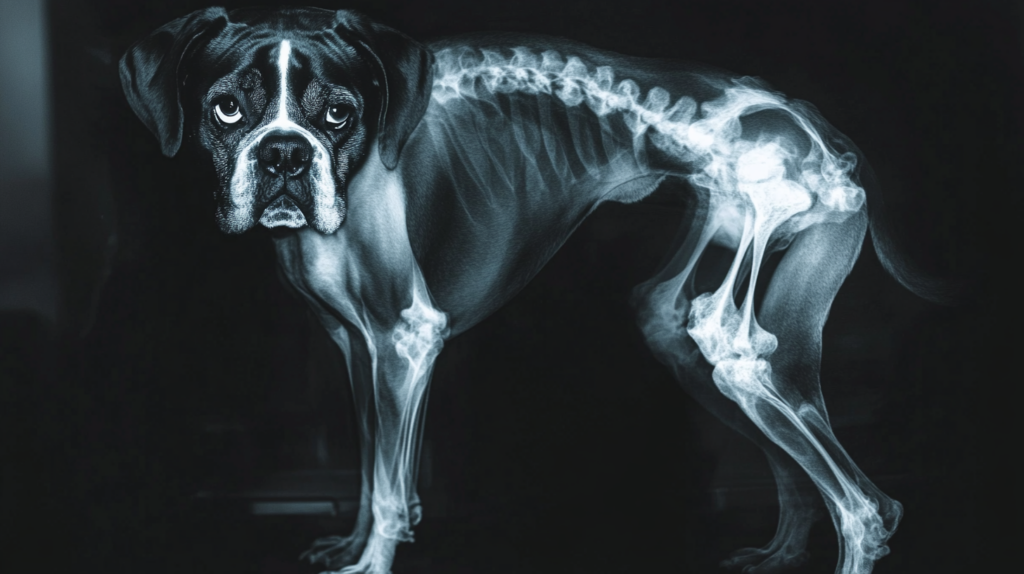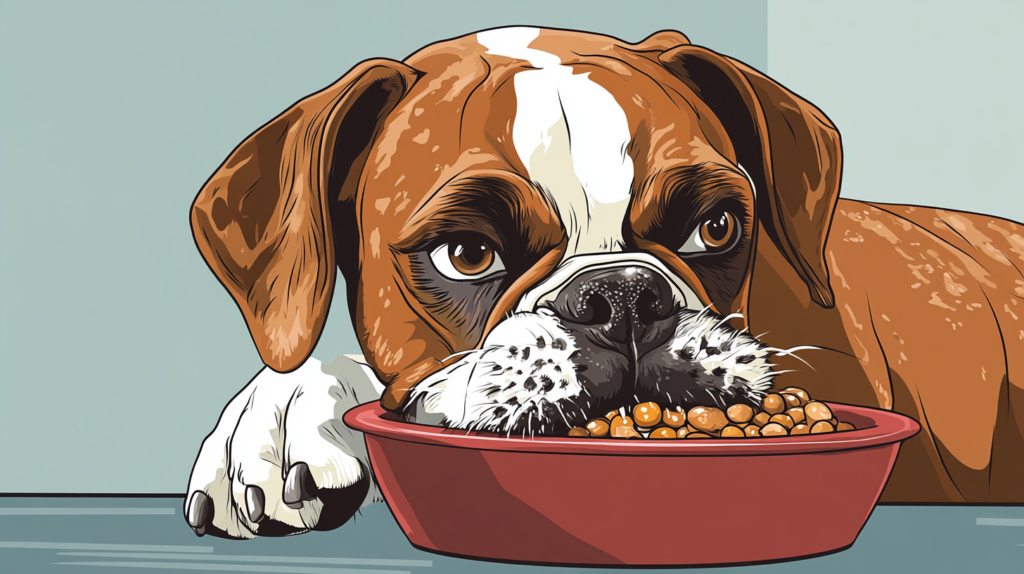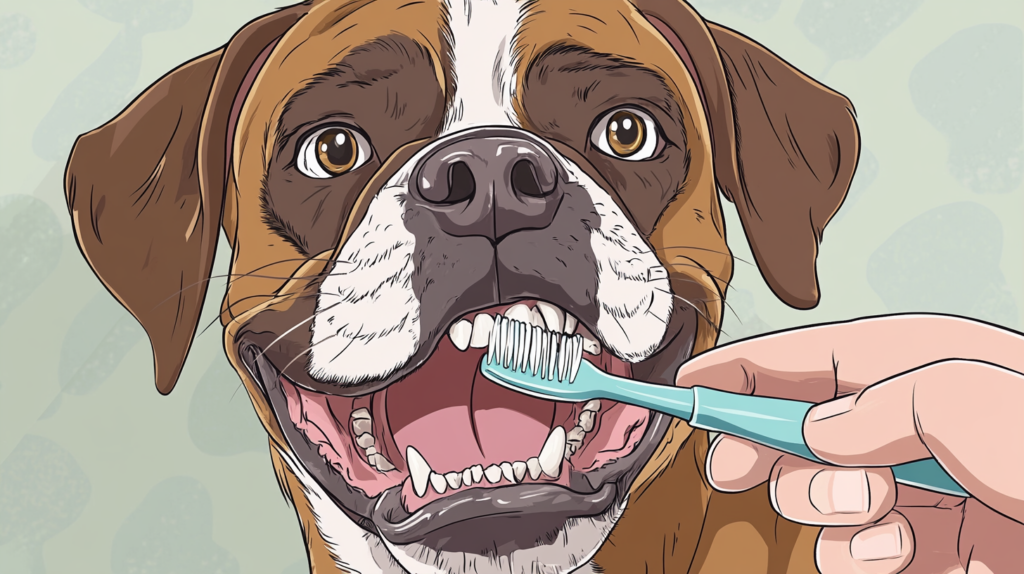Overview of Boxer Health
Boxer dogs are not just pets; they are lively companions known for their boundless energy, loyalty, and intelligence. With their distinctive deep chests and charmingly flat faces, Boxers typically weigh between 65-80 pounds and stand 21-25 inches tall. Their playful nature makes them a favorite among families, but it also comes with specific health considerations.
Understanding Boxer dog health is essential for ensuring a happy life together. Boxers are prone to certain health issues that can affect their longevity and quality of life. Proactive care can make all the difference in your furry friend’s well-being.
What will you discover in this ultimate guide?
- The most common genetic health issues faced by Boxers
- Tips for preventing health problems through proper nutrition and exercise
- Strategies for managing health issues when they arise
- Insights into enhancing your Boxer’s lifespan and overall quality of life
With the right knowledge, you can provide the best care possible for your Boxer, ensuring they remain your loyal companion for many joyful years to come.

Common Genetic Health Issues in Boxers
Boxer dogs are not just playful companions; they come with a few health quirks, some of which are rooted in their genetics. Understanding these common health issues in Boxers is crucial for ensuring they live happy, vibrant lives. With a focus on Boxer dog cancer and Boxer dog heart problems, let’s dive into the health concerns that can affect our beloved furry friends.
Boxer Dog Cancer
Cancer is one of the most pressing health challenges for Boxers. They are notably prone to various types of cancer, including:
- Brain Tumors: These can manifest as seizures or behavioral changes. Early detection and treatment are key to managing this condition.
- Mast Cell Tumors: Skin tumors that may appear as lumps or bumps on the body. Regular skin checks can help catch these early.
- Lymphoma: A common form of cancer in Boxers, characterized by swollen lymph nodes and lethargy.
Awareness of these types allows for quicker responses when symptoms arise, leading to better outcomes for your Boxer.

Boxer Dog Heart Problems
Cardiomyopathy stands out as a serious heart condition impacting Boxers, with two main types to be aware of:
Dilated Cardiomyopathy (DCM): This condition leads to an enlarged heart that doesn’t pump blood effectively. Symptoms include:
- Weakness
- Coughing
- Trouble breathing
Arrhythmogenic Right Ventricular Cardiomyopathy (ARVC): A genetic disorder affecting the heart muscle, leading to irregular heartbeat and potential fainting spells.
Recognizing signs early and maintaining regular veterinary check-ups can help manage these conditions effectively.

Other Notable Health Concerns
In addition to cancer and heart problems, there are other notable health issues that could affect your Boxer’s quality of life:
- Hip Dysplasia: This genetic malformation affects the hip joints, causing pain and mobility limitations. Symptoms often include:
- Difficulty rising
- Reluctance to exercise
- Noticeable limping
Long-term management may involve medication or surgical options depending on severity.
- Degenerative Myelopathy: A hereditary condition leading to progressive loss of coordination. It typically occurs in older dogs and significantly impacts mobility.
Understanding these conditions highlights the importance of proactive care. Regular vet visits play a vital role in early diagnosis and treatment.

The Role of Genetics in Boxer Health
Genetics shape many aspects of your Boxer’s health profile. Certain inherited conditions make them susceptible to specific diseases:
- Boxer Cardiomyopathy: Genetic predisposition places Boxers at risk for heart issues.
- Hip Dysplasia in Boxers: This common problem stems from their anatomy and breeding practices.
Being informed about these genetic health problems empowers you as a Boxer owner. Knowledge equips you with tools for preventative care, enabling you to make informed decisions that can enhance your dog’s wellbeing.
By keeping an eye on potential health concerns and understanding the unique traits of Boxers, you can create an environment where your furry friend thrives. With proactive management and a bit of love, your Boxer can enjoy a long-lasting, healthy life filled with joyful moments together.
Preventing Health Issues in Boxers
Nutrition and Diet
A well-balanced diet is a cornerstone of preventative measures for Boxer dogs. These energetic canines have unique nutritional needs that, when met, can significantly reduce the risk of health problems. Here’s what you need to know about Boxer diet and nutrition.
Key Nutritional Components:
- Proteins: Essential for muscle development and overall health. Look for high-quality protein sources such as chicken, beef, or fish. Aim for at least 20-30% protein content in their food, especially for active Boxers.
- Omega-3 Fatty Acids: These are vital for maintaining skin and coat health while also supporting joint function. Incorporate sources like fish oil or flaxseed oil into their diet. A daily dose of omega-3s can help combat inflammation and keep your pup feeling spry.
- Complex Carbohydrates: Opt for whole grains like brown rice and oats. They provide sustained energy levels without causing spikes in blood sugar, which is crucial for this high-energy breed.
- Vitamins and Minerals: Ensure your Boxer gets a variety of nutrients by including fruits and vegetables like sweet potatoes, carrots, and blueberries. These foods are rich in antioxidants that promote immune health.

Feeding Schedule:
Establishing a regular feeding schedule is key to avoiding issues like bloat (gastric dilatation-volvulus). Instead of free-feeding, consider:
- Two meals per day: Split their daily food intake into two meals to help regulate digestion.
- Slow feeders: Use slow-feed bowls to prevent rapid eating which can lead to bloat.
Portion Control:
Monitoring portion sizes helps maintain an ideal weight. Obesity can exacerbate existing health issues or lead to new ones such as diabetes or arthritis. Use the following guidelines:
- Consult your veterinarian about the appropriate amount based on your dog’s age, size, and activity level.
- Adjust portions if your Boxer shows signs of weight gain or loss.
Hydration
Never underestimate the importance of fresh water! Keeping your Boxer hydrated supports kidney function and aids in digestion. Always have clean water available, especially after exercise.
Regular Check-ups
Incorporating routine veterinary visits into your schedule ensures that any dietary adjustments can be made as needed based on your Boxer’s health status. Your vet can recommend tailored dietary plans suitable for your dog’s individual needs.
By focusing on these nutritional strategies, you set the stage for robust Boxer dog health, helping them thrive with fewer Boxer dog health problems as they age. Creating a solid foundation through proper diet not only enhances longevity but enriches every moment shared together with your furry friend.
Exercise Requirements
Boxers are energetic, playful companions that thrive on physical activity. Daily exercise is crucial for maintaining their health and happiness. Keeping your Boxer active not only supports their physical well-being but also provides mental stimulation, preventing boredom and associated behavioral issues.
Daily Exercise Recommendations:
- Minimum of 30 minutes to 2 hours: Tailor the duration based on your Boxer’s age, health status, and energy levels. Younger Boxers may require more vigorous activity, while older ones might need lighter exercises.
- Variety is Key: Engage in a mix of activities such as:
- Walking or jogging: Great for cardiovascular health and bonding time.
- Playtime: Interactive games like fetch or tug-of-war can keep them entertained and exercised.
- Agility training: Set up an obstacle course in your backyard to challenge their agility and intellect.
- Socialization Opportunities: Group playdates with other dogs can enhance their social skills while offering a great outlet for energy.
The importance of taking proactive steps to prevent health problems in your Boxer cannot be overstated. Regular exercise can help mitigate some common Boxer dog health problems such as obesity and hip dysplasia. Engaging in consistent physical activity facilitates muscle strength and joint health, reducing the risk of injuries.

Preventative Measures for Boxer Dogs:
- Monitor your dog’s energy levels after exercise; signs of fatigue may indicate the need for adjustments.
- Ensure access to fresh water during and after physical activities.
Creating a balanced routine that incorporates both exercise needs for Boxer dogs and proper nutrition will set a solid foundation for a thriving life together. A happy, healthy Boxer means more joyful moments shared!
Managing Health Issues When They Arise
Recognizing early signs of illness in Boxers is crucial for maintaining their health and happiness. These energetic, loyal companions may not always show visible symptoms until issues become serious. Regular veterinary check-ups play a vital role in monitoring your Boxer’s health. A typical canine physical exam for Boxer dogs includes:
- Weight assessment: Monitoring weight fluctuations can indicate underlying health problems.
- Heart and lung evaluation: Listening for irregular heartbeats or any respiratory issues.
- Joint and mobility checks: Identifying signs of discomfort or difficulty in movement.
Being proactive about your Boxer’s health can lead to earlier detection of potential problems, allowing for more effective treatment options.

Treatment Options for Major Health Problems
Cancer remains a significant concern among Boxers, making knowledge about treatment for Boxer dog cancer essential. If diagnosed with cancer, several treatment avenues are available:
- Surgery: Often employed to remove tumors before they spread.
- Chemotherapy: Utilized in various forms to target cancer cells while minimizing damage to healthy tissue.
- Palliative care: Focused on enhancing quality of life when curative treatments are not viable. This may include pain management and nutritional support.
The prognosis varies based on the type and stage of cancer, emphasizing the importance of consulting with a veterinary oncologist for tailored advice.
Cardiomyopathy is another prevalent issue in Boxers, affecting their heart function. Medications are often prescribed to manage this condition effectively. Key strategies include:
- Heart medications: Such as ACE inhibitors or beta-blockers, which can help regulate heart rhythm and improve blood flow.
- Ensuring a balanced diet rich in omega-3 fatty acids can support heart health.
- Gradual introduction to exercise routines to promote cardiovascular fitness without overexertion.
Regular monitoring and communication with your veterinarian are essential components in managing cardiomyopathy in Boxers. Awareness of symptoms such as coughing, fatigue, or difficulty breathing aids in timely intervention.
Creating a supportive environment at home also contributes positively to your Boxer’s well-being. Engaging them in gentle activities while providing mental stimulation—like puzzle toys—can significantly enhance their quality of life.
By staying vigilant and informed about your Boxer’s unique health concerns, you lay the groundwork for a happier life together filled with tail wags and playful moments.

Lifespan and Quality of Life Considerations
Boxers typically enjoy a lifespan of 10 to 12 years. Understanding the factors that can influence their longevity is crucial for ensuring a happy, healthy life together.
Factors Influencing Boxer Lifespan
- Genetics: Inherited traits can predispose Boxers to certain health issues, impacting their overall lifespan.
- Diet: A balanced diet rich in proteins and omega-3 fatty acids supports their health and vitality.
- Exercise: Regular physical activity is essential for maintaining a healthy weight and preventing obesity-related conditions.
- Veterinary Care: Regular check-ups can catch potential health concerns early, improving treatment outcomes.
Enhancing Quality of Life in Boxers
Creating an enriching environment for your Boxer enhances both the quantity and quality of their life. Here are some practical tips:
- Mental Stimulation: Engage your Boxer with puzzle toys or training games to keep their minds sharp.
- Socialization: Regular playdates with other dogs can promote social skills and encourage physical activity.
- Comfortable Living Space: Ensure they have a cozy area to rest, free from drafts and noise.
- Routine Check-ups: Consistent veterinary visits help monitor their health status and adjust care as needed.
A proactive approach towards these factors allows you to celebrate many joyful years with your Boxer while keeping them happy and healthy!

Conclusion
Caring for Boxers involves more than just providing food and shelter. It means understanding their unique health needs to ensure a happy life with a Boxer.
- Be Proactive: Regular veterinary check-ups are essential. Catching potential health issues early can lead to better outcomes.
- Stay Informed: Knowledge about common health problems, like cancer and cardiomyopathy, empowers you to take action when necessary.
- Healthy Lifestyle: A balanced diet rich in proteins and omega-3 fatty acids, combined with regular exercise, is vital for maintaining your Boxer’s well-being.
Recognizing the importance of these elements fosters a deeper bond between you and your furry friend. As a responsible caregiver, prioritizing Boxer dog health ensures that your companion leads a fulfilling life.
Cherish every moment spent together. Your efforts in nurturing their health will not only enhance their quality of life but also enrich your shared experiences. Embrace the journey of caring for your Boxer, and watch them thrive!

FAQs (Frequently Asked Questions)
What are common health issues faced by Boxer dogs?
Boxer dogs are prone to several genetic health issues, including cancer (such as brain tumors and mast cell tumors), heart problems like cardiomyopathy (including Dilated Cardiomyopathy and Arrhythmogenic Right Ventricular Cardiomyopathy), and hip dysplasia which can affect their mobility.
How can I prevent health issues in my Boxer?
Preventative measures for Boxers include providing a balanced diet rich in proteins and omega-3 fatty acids, ensuring daily exercise to keep them physically and mentally stimulated, and scheduling regular veterinary check-ups to catch any potential health issues early.
What nutritional needs do Boxers have?
Boxers require a specific diet that includes the right balance of proteins and omega-3 fatty acids to support their unique health needs. It’s important to consult with a veterinarian to create an appropriate meal plan.
What signs should I look for that indicate my Boxer may be ill?
Signs of illness in Boxers can include lethargy, changes in appetite or drinking habits, coughing, difficulty breathing, or unusual behavior. Regular veterinary check-ups are essential for early detection of potential health issues.
What treatments are available for cancer in Boxers?
Treatment options for cancer in Boxers may include surgery, chemotherapy, and palliative care. The choice of treatment depends on the type and stage of cancer, so it’s crucial to work closely with your veterinarian.
What is the average lifespan of a Boxer and how can I enhance their quality of life?
The average lifespan of a Boxer is typically around 10 to 12 years. To enhance their quality of life, provide regular exercise, a nutritious diet, routine veterinary care, and plenty of love and attention.






